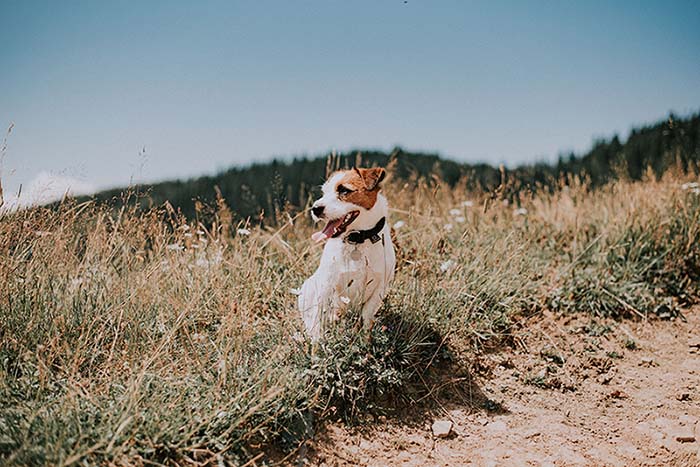Posted by Amy Wellcoat on Apr 12, 2022
Hay fever can indeed develop in dogs, just the same as us humans suffer from it in spring and summer months -our furry friends can too.
Blue Cross are a leading animal welfare charity in the UK who are campaigning for every pet to enjoy a healthy life in a happy home. They provide veterinary care and give some fantastic advise for all of us dog lovers to follow.
"Dogs can suffer from hay fever, just like humans. Whereas humans get itchy eyes, runny noses and sneezes, hay fever symptoms tend to show up in a dog’s skin, making them super itchy. Although there is no cure, you can manage your dog’s pollen allergy with topical treatment and medications from your vet." - Blue Cross.

What is hay fever?
Hay fever in dogs is caused by a reaction to certain types of allergens like pollen, especially in spring and summer. It's a type of allergic reaction to the pollen in the air, and is usually shown in dogs through skin irritation rather than sneezing or a runny nose like humans get.
Hay fever can be caused by different types of pollen, tree pollen is rife from the end of March to the middle of May, grass pollen from the middle of May to July, and weed pollen is around from the end of June until September.
Research suggests that exposing your dog to different types of pollen in their early life can help them build an immunity to hay fever symptoms. Dogs can develop hay fever at any ages but it does usually begin in their early life.
What are the symptoms of hay fever in dogs?
A pollen allergy usually affects the skin in dogs. Keep an eye out for your dog itching or nibbling any of these areas,
- Paws
- Legs
- Groin
- Around their bum
- Armpits
- Eyes, ears, mouth & muzzle
- Abdomen
The skin under their coat can look quite flaky like dandruff, and can get red and sore from all the itching. Excessive itching and nibbling can lead to your dog losing some fur in those areas, so keep an eye on the condition. Their skin can also look completely fine but feel really itchy to them.
If you think your dog is suffering from hay fever or any other kinds of allergies, make an appointment with your vet to be safe. Too much itching can lead to worsening conditions of the affected areas, like inflammation, broken skin, build up of bacteria and yeast, which can also lead to skin, ear and eye infections.
How do you treat hay fever in dogs?
Like human hay fever, it can't be cured, but there are many medicines and supplements that can help with the side effects. Your vet will be able to supply specific treatments to help with particular irritated areas. These can include:
- Medicated eye & ear drops
- Medicated shampoos, sprays and creams. Like this itch relief shampoo
- Ear cleaners like these wipes and washes
- Natural supplements like Skin & Coat by Proflax
- Medication to reduce the immune reaction including steroids for severe reactions
- Antihistamines (some human antihistamine tablets can be toxic to dogs, so be careful and always check with your vet to be safe)
How to avoid hay fever flare ups in dogs
- Wipe down your dog's fur and skin with a damp cloth after every walk to remove pollen
- Hoover your dog's living space and your house regularly
- Wash their bedding regularly
- Keep their ears clean to prevent over grooming irritation
- An air filter system in your home will help to keep the air clean, this works well for human hay fever too
- Pollen counts are higher during the middle of the day, walk your dog early morning or later in the evening to avoid this
- Keep your windows closed to avoid pollen entering the house
